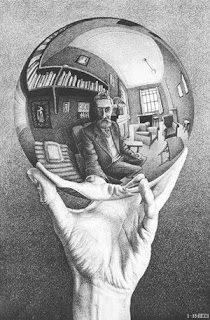
“When I put the flower near your eyes, they twinkle again”
~8 year-old boy to his mother on her birthday. The mother was recovering from severe depression.
Where does the gaze fall? What do I see? What makes me twinkle inside? What repels me?
The eyes are the window to the soul, but so too are they the soul’s window onto the world.
I can perceive the world as harsh and grasping, like it could eat me up or skin me alive, and then feel compelled to turn away from it. But the world has no claws. Really, when I feel this way, it is aversion that has taken hold of me from the inside. When I recoil from phenomena, when I avert my gaze, in fact I turn my soul upon its own darkness. That is why introversion (or perhaps more aptly extro-aversion), in the extreme, can lead to depression.
I can perceive the world as the source of love and light and inspiration, but be prone to covet and consume what it proffers as “good”. Yet I cannot assimilate things which are not things, and grasping them just extinguishes their flame. Now it is attraction which has got hold of me and my soul has come to feel like a desert. Ths is why extroversion (intro-aversion), in the extreme, can lead to addiction, even when the quest for an oasis can have every appearance of selflessness.
There are more benign forms of introversion and extroversion, but doesn’t every point on the continuum between the extremes fail in some way to secure a fit between me and the world?
I know a shy adolescent girl who is an avid reader and has brilliant insights into the books she reads, but because she is unable to translate her ideas from verbal to written form, her English grades are mediocre when they could be exceptional. I experience a similarly difficult transition when I wake up in the morning. When my eyes are closed, my mind is quite clear and creative, but the minute I open my eyes and sit up, poof! like mist in the sun, any thoughts dissipate completely. So many good ideas— exiled forever to the land of missing socks.
When we remain responsive, aware and awake to what's going on inside and out, the effects can be transformative, as in analysis, EMDR or meditation. Closed eyes and a reclining position facilitate free association,a kind of mental opening to emotional material. This is why analysts have people lie on the couch, I suppose. It loosens the mind during verbalization. EMDR and some forms of meditation, on the contrary, are done sitting up and with the eyes open. This grounds a person against the destabilizing effect of the thoughts and emotions that can arise during stillness and silence.
Neither introverted nor extroverted-- what shall we call the mind’s eye when the whole surface of its mirroring orb is engaged as reflection? Is it the activation of both cerebral hemispheres, is it “dual attention”, simultaneously gazing inward and outward, or on the edge of both, linking creative hypnagogic states to lucidity, energy to inertia, emotion to cognition? Is it the synthesis of opposites or is it beyond duality? Something else completely?
Like a tent drawn upright by being pulled equally in opposite directions, the mind becomes taut, erect, spacious, stable.





